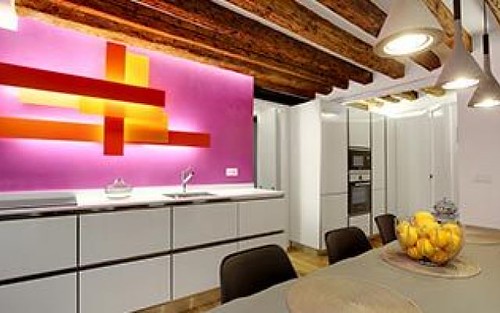Tech and Trends: The Future of Shortlets Explained


Ezekiel Muoneke
Content Writer
- Blog
- August 20, 2023
- 11:34 am
Shortlets, also known as short-term rentals, are properties that are rented out for less than six months, usually on a daily or weekly basis. They are popular among travellers who want to enjoy the comfort and convenience of a home away from home, as well as property owners who want to earn extra income from their unused spaces.
In recent times, the landscape of the hospitality industry has witnessed a remarkable transformation, largely driven by technological innovations and shifting travel preferences. One of the most notable shifts is the rapid evolution of the short-term rental sector. From the advent of online platforms to the integration of cutting-edge amenities, the future of shortlets looks promising and dynamic. According to a report by Grand View Research, the global short-term rental market was valued at $106.4 billion in 2019 and is expected to grow at a compound annual growth rate (CAGR) of 3.4% from 2020 to 2027.
However, the short-term rental industry is not without challenges and opportunities. As the demand for shortlets increases, so does the competition among hosts, as well as the regulation and taxation by governments and municipalities. Moreover, the expectations and preferences of guests are constantly changing, especially in the aftermath of the COVID-19 pandemic, which disrupted the travel industry and accelerated the adoption of digital technologies. In this article, we will explore some of the key trends and technologies that are shaping the future of shortlets and how they can benefit both hosts and guests.
Trend #1: The Power of Online Platforms: A Paradigm Shift
The conventional methods of booking accommodations have given way to the rise of online platforms that have completely reshaped the way people find and book short-term rentals. Platforms like Airbnb, Vrbo, and Booking.com have revolutionised the industry by offering a user-friendly interface where property owners can list their spaces and travellers can find unique stays across the globe. This shift from traditional booking methods to digital platforms has democratised travel, making it accessible to a wider audience.
Trend #2: Technology's Impact on Guest Experience
Technological advancements have not only revolutionised the way short-term rentals are booked but have also significantly enhanced the overall guest experience. The integration of smart home features has become a hallmark of modern shortlets. Guests now have the convenience of keyless entry systems, allowing them to access their accommodations with a simple tap on their smartphones. Automated amenities such as smart thermostats and lighting systems empower guests to personalise their environment, creating a home-away-from-home experience.
The integration of virtual concierge services and instant messaging platforms has transformed communication between hosts and guests. Travellers can easily communicate their needs, ask for recommendations, and seek assistance through digital channels. This seamless communication not only enhances the guest experience but also enables hosts to provide real-time support, fostering a sense of trust and reliability.
Trend #3: Sustainability and Eco-Friendly Stays
As the world becomes increasingly environmentally conscious, the short-term rental industry is responding by incorporating sustainable practises. Travellers today are not only seeking unique accommodations but are also placing a strong emphasis on eco-friendly options. This trend has prompted property owners to integrate green initiatives into their shortlets.
From solar panels and energy-efficient appliances to waste reduction strategies, short-term rental properties are embracing sustainable technologies. These initiatives not only attract eco-conscious travellers but also align with the broader global movement towards sustainability. By adopting environmentally friendly practises, shortlet hosts are not only contributing to a greener future but also reaping long-term cost savings.


Trend #4:The Rise of Hyper-Personalization
The era of one-size-fits-all travel experiences is fading away. With the aid of data analytics, the short-term rental industry is embracing hyper-personalization, catering to individual preferences and needs. Hosts can leverage guest data to curate tailored experiences that go beyond traditional accommodations.
Imagine arriving at a short-term rental where your favourite snacks are waiting and the in-room recommendations are based on your past preferences. This level of personalization not only creates a memorable experience but also establishes a strong emotional connection between guests and their chosen accommodations. The power of data-driven personalization is transforming shortlets from mere places to stay into immersive, memorable journeys.
Trend #5: Navigating Regulation and Trust


One of the main challenges facing the short-term rental industry is the lack of clear and consistent regulation across different markets. While technology and innovation have propelled the short-term rental industry forward, they have also brought about challenges in the form of regulations and concerns around trust and safety. Many cities and municipalities have introduced regulations to address issues like housing shortages and noise disturbances caused by short-term rentals. This evolving regulatory landscape requires industry stakeholders to navigate complex legal frameworks while ensuring a positive guest experience.
Additionally, maintaining trust between hosts and guests is essential for the continued growth of the short-term rental sector. To address this, platforms have introduced verification processes and user reviews that enhance transparency and build confidence. Establishing a sense of trust not only ensures the safety of guests but also contributes to the credibility of the entire industry.
ENJOYING THE ARTICLE?
Sign up For Our Newsletter
Trend #6: Growth of Alternative Accommodations
Another trend that is shaping the short-term rental industry is the diversification of accommodation options beyond traditional hotels and apartments. As travellers look for more unique and authentic experiences, they are increasingly opting for alternative types of shortlets, such as tiny homes, yurts, glamping tents, treehouses, boats, castles, igloos, and more. These properties offer guests the opportunity to immerse themselves in nature, culture, or history while enjoying the amenities and comforts of a modern home.
Trend #7: More Long-Term Opportunities
Another trend that is affecting the short-term rental industry is the increase in demand for longer stays, especially in the wake of the COVID-19 pandemic, which has enabled more people to work remotely and travel flexibly. According to data from Airbnb, the share of bookings for 28 days or more increased from 14% in 2019 to 24% in 2020. Similarly, according to data from Vrbo, the average length of stay for its travellers increased by 58% in 2020 compared to 2019.
Long-term stays offer several benefits for both hosts and guests. For hosts, they can reduce vacancy rates, increase occupancy rates, lower operational costs, and generate more stable and consistent income. For guests, they can enjoy lower rates, more space, more amenities, and more flexibility than in hotels or traditional rentals. Moreover, long-term stays can foster a sense of community and belonging among hosts and guests, as well as among local residents and businesses.
Trend #8: The Future Landscape: Embracing All Changes
Looking ahead, the future of short-term rentals promises to be a captivating blend of technology, innovation, and evolving trends. Virtual reality (VR) and augmented reality (AR) are poised to revolutionise the way travellers experience potential accommodations. Imagine being able to virtually tour a shortlet, exploring every nook and cranny before making a booking decision. This immersive experience not only saves time but also fosters a stronger connection between travellers and their chosen accommodations.
Blockchain technology also holds significant potential for reshaping the industry. By creating decentralised platforms, blockchain could streamline the booking process, increase transparency, and reduce the reliance on intermediaries. This would in turn empower property owners and travellers alike, offering a more efficient and cost-effective way to engage in short-term rentals.
Concluding Thoughts
Technology, sustainability, personalization, and the pursuit of trust are driving a remarkable transformation in the short-term rental industry. As we embrace this change, it’s clear that shortlets are no longer just a place to stay but a gateway to unique experiences. Whether you’re a traveller seeking an authentic local encounter or a property owner looking to provide unforgettable stays, the future of short-term rentals holds endless possibilities.
In a world where travel preferences evolve and technology continues to advance, the short-term rental industry’s ability to adapt and innovate will determine its continued success. By harnessing the power of technology, embracing sustainability, and prioritising personalization, the future of shortlets looks bright and promising.
Partner with us for Digital Marketing Success


At Zero Marketing Solution, we understand the importance of embracing new technologies and trends to excel in the digital landscape. As experts in digital marketing, we can help your business adapt to the era of machine customers and create a winning strategy. Contact us today to embark on this exciting journey and take your business to new heights of success. Say goodbye to average results and hello to digital triumph!
Share this article
Ready to accelerate your company's brand transformation?
We look forward to getting to know you, talking CX, and (our favorite part) learning how we can make your life easier.











